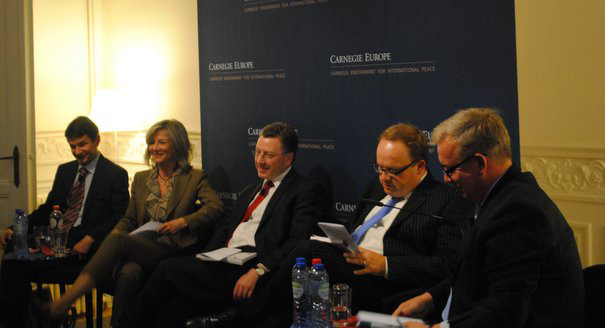Registration
Thank you!
You will receive an email confirming your registration.
IMGXYZ3913IMGZYXAt a time when transatlantic leaders face multiple crises, the Nordic-Baltic region is an unsung success story that offers a model of how to retain U.S. engagement in Europe.
Carnegie Europe, together with the Johns Hopkins School of Advanced International Studies, hosted an expert debate on how Nordic-Baltic cooperation with the United States can contribute to a forward-looking agenda for NATO and the EU. This event marked the launch of the newly-released “Nordic-Baltic-American Cooperation: Shaping the U.S.-European Agenda," edited by Kurt Volker and Ieva Kupce.
Event Highlights
- U.S. Engagement: Panelists agreed that a transatlantic relationship remains fundamentally essential. The United States and Europe share core values, Volker added, such as freedom, democracy, rule of law, market economy, and human rights. While the relationship is not growing rapidly in cross investment and economic interaction, this growth is still substantial, he added. Considering the rise of globalization and rebalancing of global powers, Volker insisted that strategizing, developing, and nurturing the transatlantic relationship is critical.
- Relating on Russia: Volker argued that there is a lot to learn from the way the Nordic-Baltic region has managed its relationship with Russia, both constructive and as well as cautious and resilient. Leskivicius suggested that the Nordic-Baltic region’s future engagement with Russia should focus primarily on paying political attention to, and investing in, the civil societies of each country involved.
- Threat Perceptions Among Allies: Panelists were presented with the question, “What is the most important security threat to your country?.” Panelists representing the United States stated their most important security threat was a lack of confidence. Panelists representing Estonia responded they were concerned by the de-linkage across the Atlantic, while panelists from Lithuania expressed worry over the lack of public resilience and those from Sweden cited the undermining of European solidarity. These threat perceptions, Techau has suggested, reveal real risks to European security and, by extension, present concrete tasks for improvement to both NATO and the European Union.
- Embedding Regional Cooperation: Panelists supported the concept of embedding personnel and increasing interoperability to achieve greater efficiency and regional coordination, especially on issues such as environmental and energy security, military and air policing, and cyber security. Ambassador Wand-Danielsson highlighted political and security dimensions of regional cooperation, warning that activities for cooperative engagement in the Nordic-Baltic context must not undermine solidarity. Panelists discussed how the countries engaged in the Nordic-Baltic region accept responsibility for managing global issues by vesting economic, political, security, and diplomatic weight behind efforts to find solutions.
